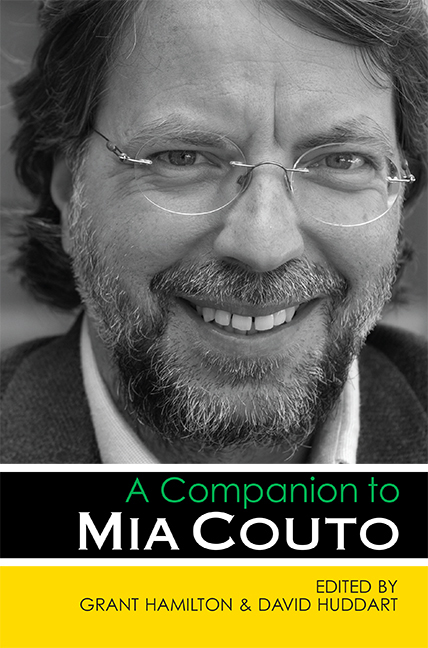Book contents
- Frontmatter
- Dedication
- Contents
- Acknowledgements
- Notes on Contributors
- Introduction
- An Interview with Mia Couto
- 1 Mia Couto in Context
- 2 Uma coisa fraterna Mia Couto & the Mutumbela Gogo Theater Group
- 3 Reading Raiz de orvalho Counterpointing Literary Genres in the Work of Mia Couto
- 4 Spaces of Magic Mia Couto’s Relational Practices
- 5 Mia Couto or the Art of Storytelling
- 6 The Multiple Worlds of Mia Couto
- 7 ‘Ask Life’ Animism & the Metaphysical Detective
- 8 Mia Couto & Translation
- 9 Jesusalém Empty Fathers & Women’s Texts
- 10 Trauma Repetition & Pure Repetition in The Tuner of Silences
- 11 Seeing Like a Crocodile Bird Mia Couto’s The Last Flight of the Flamingo
- 12 Mia Couto & Nostalgia Reading The Last Flight of the Flamingo
- 13 Mia Couto, Contexts & Issues A Bibliographic Essay
- Bibliography
- Index
10 - Trauma Repetition & Pure Repetition in The Tuner of Silences
Published online by Cambridge University Press: 22 May 2021
- Frontmatter
- Dedication
- Contents
- Acknowledgements
- Notes on Contributors
- Introduction
- An Interview with Mia Couto
- 1 Mia Couto in Context
- 2 Uma coisa fraterna Mia Couto & the Mutumbela Gogo Theater Group
- 3 Reading Raiz de orvalho Counterpointing Literary Genres in the Work of Mia Couto
- 4 Spaces of Magic Mia Couto’s Relational Practices
- 5 Mia Couto or the Art of Storytelling
- 6 The Multiple Worlds of Mia Couto
- 7 ‘Ask Life’ Animism & the Metaphysical Detective
- 8 Mia Couto & Translation
- 9 Jesusalém Empty Fathers & Women’s Texts
- 10 Trauma Repetition & Pure Repetition in The Tuner of Silences
- 11 Seeing Like a Crocodile Bird Mia Couto’s The Last Flight of the Flamingo
- 12 Mia Couto & Nostalgia Reading The Last Flight of the Flamingo
- 13 Mia Couto, Contexts & Issues A Bibliographic Essay
- Bibliography
- Index
Summary
In an interview following the publication of his English-language edition of The Tuner of Silences (2012), Mia Couto asserts without hesitation that ‘the search for identity is the main issue in all of my books’ (Esposito 2013). True. But to an account of the important recursive concerns of Couto's prose fiction, one should perhaps also add language, the environment, war, the real, history, and, I would venture, trauma. Indeed, while themes such as identity, language, and war may be explicit in his writing, it is clear that Couto always arrives at these sites by having his characters first travel through a psychologically traumatic experience. Here one can think of Ermelindo in Under the Frangipani (2001), Muidinga in Sleepwalking Land (2006), and Abstinêncio in A River Called Time (2008). That being said, figures such as these also make clear the fact that although trauma is everywhere in Couto's writing, it has never been the subject of his sustained engagement. Put simply, for Couto, trauma has never been anything other than that which makes possible the stage upon which his chosen actors – identity, language, war, and so on – play.
For this very reason, then, The Tuner of Silences occupies a position of singular importance in Couto's oeuvre. It is the first work that Couto dedicates wholly to the question of trauma itself. Indeed, it is a novel that is concerned with not only understanding trauma, but also exploring possible ways of mitigating the condition. In consciously grappling with the many enigmatic qualities of trauma, it would appear that Couto is particularly interested in the act of repetition – the very act that many regard as the definitive feature of trauma and the traumatic experience (Caruth 1995, 4). This is genuinely exciting because although repetition sits at the heart of the experience of trauma, it remains perhaps the most under-theorized aspect within contemporary trauma studies. Although I would not want to suggest that Couto carries out a grand theorization of repetition in his novel, I do want to propose that he at least complicates the idea of repetition as something that can be understood simply as a return of the same.
- Type
- Chapter
- Information
- A Companion to Mia Couto , pp. 170 - 187Publisher: Boydell & BrewerPrint publication year: 2016



